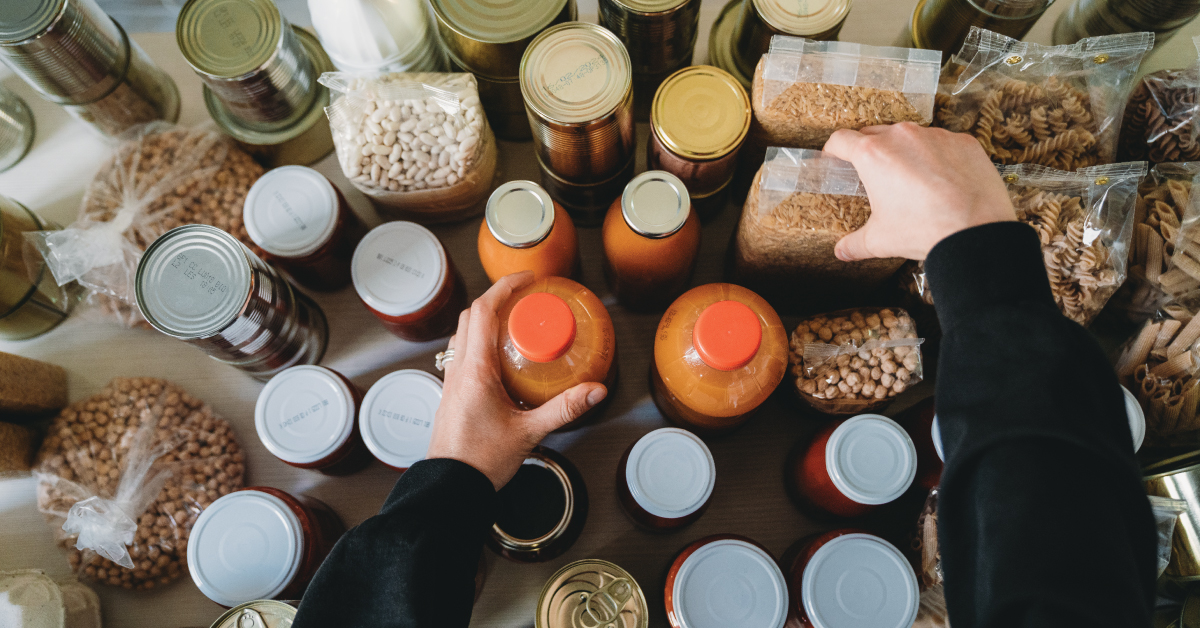Quick Reminder of Some General Food Safety Tips:2
- Wash your hands, utensils, and surfaces often when you cook.
- Meat products (raw meat, poultry, seafood, and eggs) can spread germs. Keep them away from cooked food and fresh produce.
- Cook food to an internal temperature that kills germs; use a food thermometer to check.
- Refrigerate perishable foods and leftovers within two hours, and if it’s above 90°F, chill within one hour.
Food Safety Emergency Prep:
Prepare an emergency food supply. It’s a good rule of thumb to keep at least a 3-day supply of food for each person and pet in the household.
Make sure your food:4
- Has a long shelf life
- Requires little or no cooking, water, or refrigeration
- Is appropriate for those in your household, including babies or adults with special dietary needs
- Includes the needs of pets
- Is not very salty or spicy, as these foods increase the need for drinking water
For further reference, the federal government has a list of suggested foods for emergencies.
How to Store an Emergency Food Supply:
When preparing food supplies, it is not necessary to buy dehydrated or other types of emergency food.5
- Check the expiration dates on canned foods and dry mixes. Home-canned food usually needs to be thrown out after a year.
- Use and replace food before its expiration date.
Proper storage conditions can increase the shelf life of canned or dried foods. The ideal location is a cool, dry, dark place, at a temperature between 40° and 70°F.
- Food stored in boxes or paper containers will be usable longer if it’s heavily wrapped or stored in waterproof, airtight containers.
- Store food on shelves that will be out of the way of storm waters.
Prepare an Emergency Water Supply6:
- Have on hand at least 1 gallon of water per day for each person and each pet. Store more if your family has ill or pregnant members.
- If your bottled water has an odor, do not drink or use it.
- Check the expiration date for store-bought water, and swap out other stored water every 6 months.
- Store a bottle of unscented liquid household chlorine bleach to disinfect your water and to use for general cleaning and sanitizing. The amount of active chlorine in bleach decreases over time, so the bottle should be replaced each year.
Preparing for a Power Outage:
- Use appliance thermometers in your refrigerator and freezer. The freezer should be at or below 0° F, and the refrigerator should be at or below 40° F.
- In advance of a disaster, make ice cubes, freeze gel packs and containers with water to help keep food cold in the freezer, refrigerator, or coolers. Store these items in the freezer to be used later in the refrigerator or coolers.
- The melting ice in the containers of water will also supply safe drinking water.
- Freeze refrigerated items such as leftovers, milk, and fresh meat and poultry that you may not use immediately.
- Help food stay cold for longer by grouping items together.
- Use coolers if the power might be out for more than 4 hours.
Power Outage During an Emergency7:
- Keep the refrigerator and freezer doors closed to keep the temperatures cold.
- A refrigerator will keep food cold for about 4 hours if unopened.
- If the door is kept closed, a freezer that is full will keep the temperature steady for about 48 hours, but only 24 hours if half-full.
- Make sure to thoroughly cook all items to destroy any foodborne bacteria. If at any point the food was above 40º F for 2 hours or more (or 1 hour if the temperature was above 90 º F) throw it out.
- In a snowstorm, don’t use the outdoors to keep perishable food cold, as temperatures may fluctuate and conditions can be unsanitary due to wild animals.
Power Outage After an Emergency:
- Review the following points to see if your food is still safe8:
- Check the appliance thermometer in your refrigerator and freezer when the power is restored. If the freezer thermometer is at 40° F or below, the food is safe and may be refrozen.
- If a thermometer was not in the freezer, check each package of food to determine its safety. If the food still contains ice crystals or is 40° F or below, it is safe to refreeze or cook.
- Refrigerated food should be ok if the power was out for no more than 4 hours and the refrigerator door was kept shut.
- Get rid of any perishable food (meat, poultry, fish, eggs, or leftovers) that has been at temperatures above 40° F for 2 hours or more (or 1 hour if temperatures are above 90º F).
- Toss the following foods:
- All perishable foods including meat, poultry, fish, eggs, and leftovers in your refrigerator if the power has been off for 4 hours or more.
- All perishable foods in your freezer if they have thawed.
- Anything not in waterproof containers, such as cardboard packages, including baby formula boxes.
- Comes in containers that have screw-caps, snap-lids, twist caps, or flip tops
- Was home-canned, as these foods cannot be disinfected.
- Anything that has come into contact with storm water.
Remember: when it doubt, throw it out!
Sources:
1, 2. https://www.cdc.gov/foodsafety/education-month.html
3. https://www.foodsafety.gov/
4-8. https://www.foodsafety.gov/keep-food-safe/food-safety-in-disaster-or-emergency




